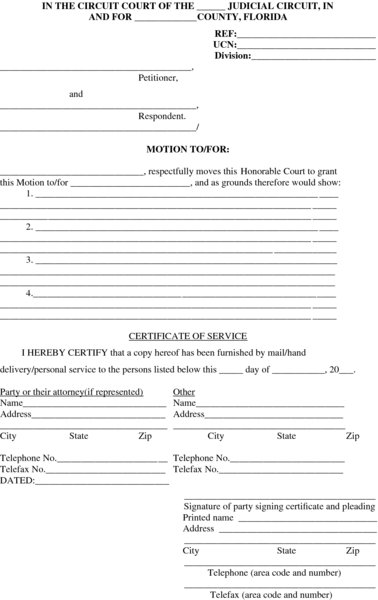CHAPTER 15 The Financial Expert Witness and Motions and Hearings
 MOTIONS
MOTIONS
Motions are used by a disputing party to request that the court issue a favorable ruling or order for something to be done in a pending dispute. Motions can be made orally or in writing. Oral motions are most common during hearings, deposition, or trial. Often, written motions are accompanied by supporting documents and witness statements. There are a few motions that commonly use statements, such as declarations and affidavits, prepared by the financial expert witness. These motions are described more fully below.
Exhibit 15.1 is a sample motion form prepared by the Sixth Judicial Circuit Court of Florida.

Exhibit 15.1 Motion Form
Source: Sixth Judicial Circuit Local Form, Motion to/for 12–2002, www.jud6.org.
Injunction
An injunction is a court order for a party to stop doing something harmful to another party. Alternatively, an injunction can require a party to do something in order to prevent injury to another party. Injunctions may be either temporary or permanent, depending on the specific case facts and circumstances. Injunctions are covered by the Federal Rules of Civil Procedure (FRCP), Rule 65. At the heart of an injunction is the premise that irreparable damage will be done if an injunction ...
Get Financial Expert Witness Communication: A Practical Guide to Reporting and Testimony now with the O’Reilly learning platform.
O’Reilly members experience books, live events, courses curated by job role, and more from O’Reilly and nearly 200 top publishers.

